Identify a few key words or key phrases that could be used to tag your work – e.g. assessment, literacy, raising achievement
Homework, homework and attainment, flipped learning, consolidation homework
Why did you decide to undertake this project? What was it designed to achieve/what issue were you looking to address?
The main aims of this project were to analyse the value of homework and whether different styles of homework lead to a greater impact on attainment. The project focused on answering the following questions:
- Is homework valuable?
- Which type of homework resulted in the best progress?
- What do students prefer?
- What do teachers find?
- How can we maximize the effectiveness of homework based on findings?
Wider Reading
Previous studies into the impact of homework provide varying thoughts on how effective it is.
The Sutton Trust rates homework as being a cost-effect means of students making progress. (The Sutton Trust, 2014)
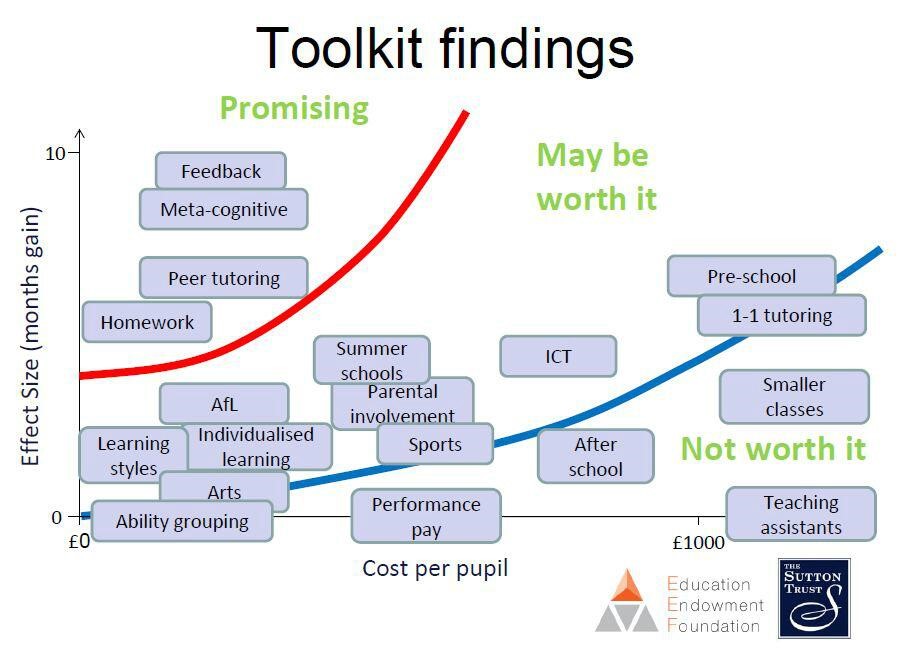
John Hattie suggests that homework is more valuable in secondary school than primary (Hattie 2014). The research carried out in this project therefore focused on KS3 students.
Homework to consolidate
With regards to the style of homework students should be completing, John Hattie advises that “the best thing you can do is reinforce something you’ve already learned.” (Hattie, 2014)
In support of this, the Sutton Trust recommends to teachers that “planned and focused activities are more beneficial than homework which is more regular but routine or not linked with what is being learned in class.” (The Sutton Trust, 2014)
Preparation homework
Other research suggests that students make greater progress if they are able to teach themselves, i.e. the idea of flipped learning. In his research on “What makes great teaching”, Robert Coe advises that one practice which can improve attainment involves, “making students take tests or generate answers, even before they have been taught the material”. (Coe, 2014)
Furthermore, Hattie suggests that attainment can be improved by “increasing the amount of feedback” as “it is the feedback to the teacher about what students can and cannot do that is more powerful than feedback to the student”. He also argues that “the greatest effects on student learning occur when the teachers become learners of their own teaching and when students become their own teachers”. (Hattie, 2009)
Discussion
Homework vs No homework
The variety of sometimes conflicting advice based on research studies into homework can lead teachers to be unsure as to how to set homework to maximise its impact on students’ attainment. It would seem that research suggests that homework is beneficial at secondary school level, however the type of homework which should be set is less clear, with Hattie himself suggesting that homework should both consolidate classwork, but also that students teaching themselves, perhaps through flipped learning, is also effective.
Based on prior reading summarised above, this research project aims to compare the effects of the two types of homework to analyse whether one does in fact have a greater impact on progress. Furthermore, the research above does not suggest the effects of the two types of homework on specific subjects, as it is possible for consolidation or preparation homework to be better suited to certain subjects and not to others. As a result of this, this study will take into account different subjects to ascertain the impact.
Write a brief summary of what you did during the implementation of this project
Is homework valuable?
As a starting point for this study, it is necessary to explore whether the act of completing homework in general has an impact on attainment, compared to no homework at all. This graph shows the attainment percentage increase made by three mixed ability French classes who experienced varying levels of homework and no homework.
As shown in the graph, setting homework had a significant impact on how well classes retained content and led to more progress being made on average. However, although setting both written and learning homework did lead to the greatest increase on attainment, the difference compared to just written homework, is not as great. It is worth considering how we set revision homework, as a specific task to complete rather than open-ended revision could prove more beneficial to some students. It would be interesting to compare the effects of open-ended revision to more focused revision tasks.
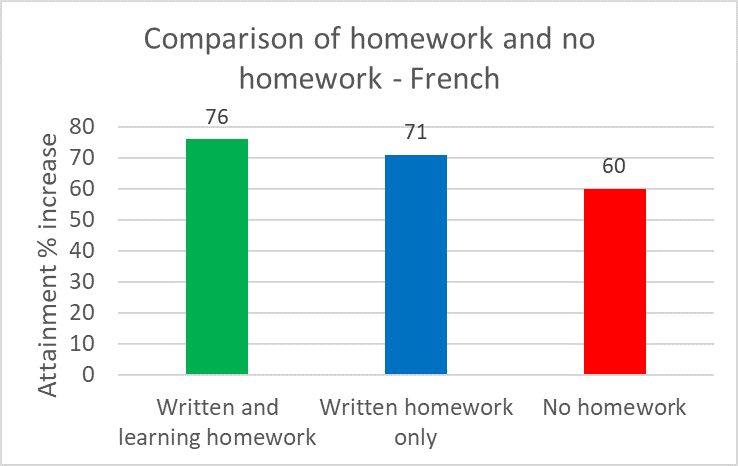
Consolidation homework vs Preparation homework
With regards to comparing the impact of consolidation and preparation homework, the two types of homework were trialled by students of a variety of abilities in Years 8 and 9, within four different subjects. The students were assessed on the content before and after both homework types in order to measure the average percentage increase in attainment.
With this being a short-term study carried out in a real school where other factors may be an influence, it is necessary to be aware of some limitations of the research:
- Different topics can have varying level of difficulty; for example, in maths, students had already studied one of the topics in year 7, so had an advantage when trialling the preparation homework.
- It cannot be guaranteed that the homework is the only influence on attainment, although generally students were not told in advance when they would be assessed on the content, to prevent them from completing work or revision beyond the homework they were set.
Impact on attainment
These graphs show the overall results in each subject for the two types of homework trialled. It could be suggested that subjects which are more skills-based do not benefit as much from preparation homework compared to more knowledge-based subjects (taking into account the anomaly of Maths where the students had an advantage in the preparation homework).
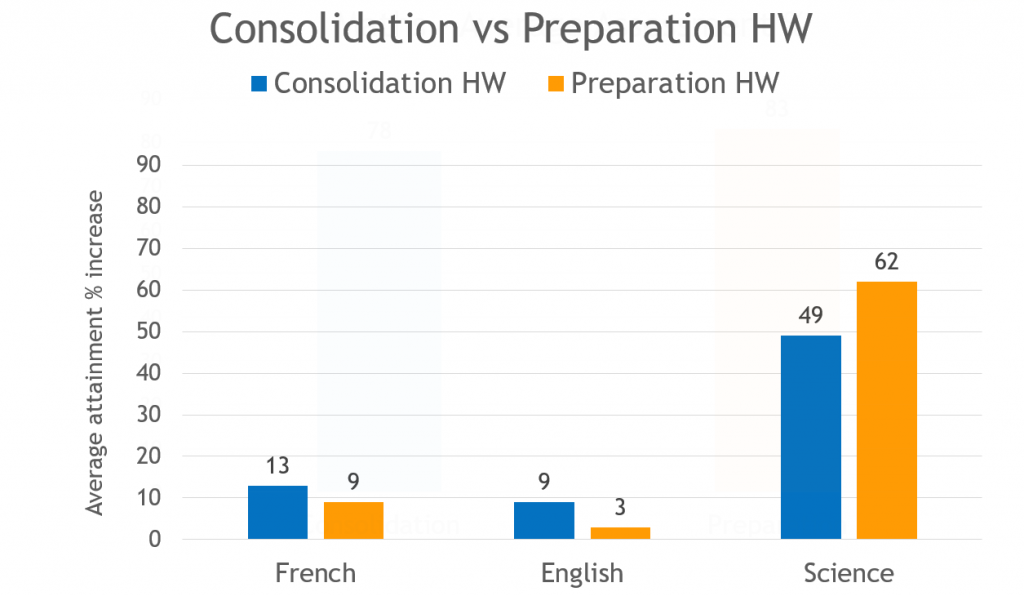
Science showed a significant increase in attainment when trialing the knowledge-based preparation homework, even though as will be shown later, students found this type of homework more challenging. With the variety of subjects still being quite limited in this study, it would be interesting to carry out similar research in other knowledge-based subjects such as Geography.
English clearly showed that they made less progress when completing preparation type homework, even though a number of students in the class said they preferred it because it gave them time to prepare for an upcoming assessment.
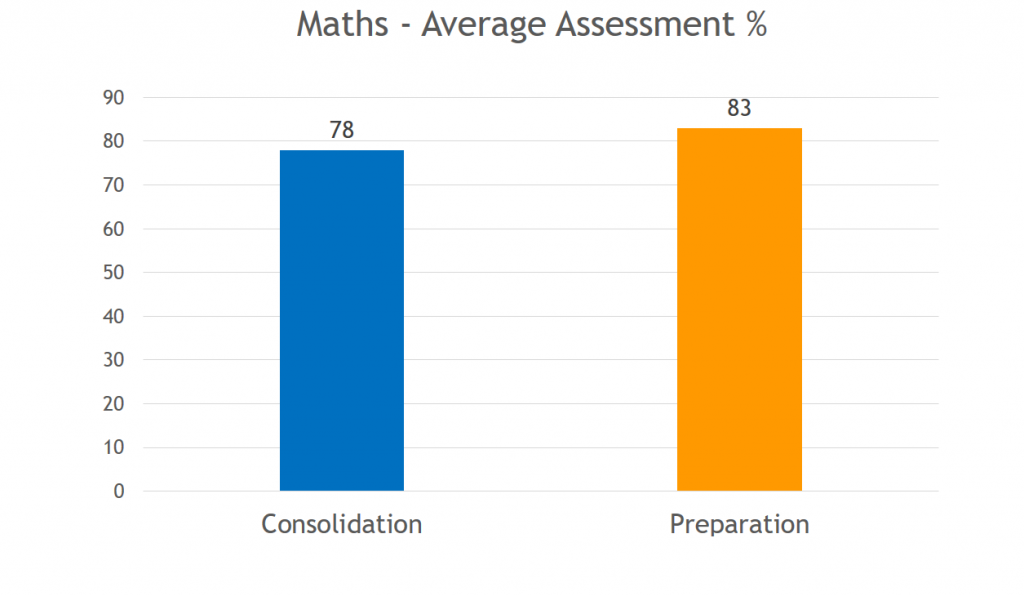
What do students prefer?
All students involved in the study completed a survey after trialling the two styles of homework, which brought to light some interesting and often astute opinions:
- 76 % of students across the 4 subjects preferred consolidation-style homework.
- 59% felt that completing a homework ahead of the lesson gave them a better understanding of a new topic.
- 81% felt that completing homework after a lesson helped them improve on what they’d learnt in class.
Generally, the students’ feelings are in line with the progress they made. Students were clearly in favour of consolidation homework, possibly because they are more used to this style of homework, and find it easier to complete. They can also see the point of this type of homework and see how it can benefit them. However, students were less sure of the benefits of preparation homework, although over half felt that it did help them. Further comments provided by the students further support these feelings shown in the survey:
For consolidation HW:
“If I didn’t understand something, I could go over it.”
“We can look back at class notes to help us.”
“We can do more challenging homework when consolidating.”
“It reinforces the information we’ve learnt and we can answer questions independently.”
For preparation HW:
“When I find out something for myself, I find it easier to remember.”
“Gives us a chance to plan our ideas so what we write in class is the best it can be.”
“In class you only need to do a quick recap then you can move onto harder mastery questions.”
“It encourages your imagination.”
It is interesting to note that some students were able to see the benefits of preparation homework, even if they preferred consolidation homework. The following pie charts also show the perception of challenge for each type of homework.
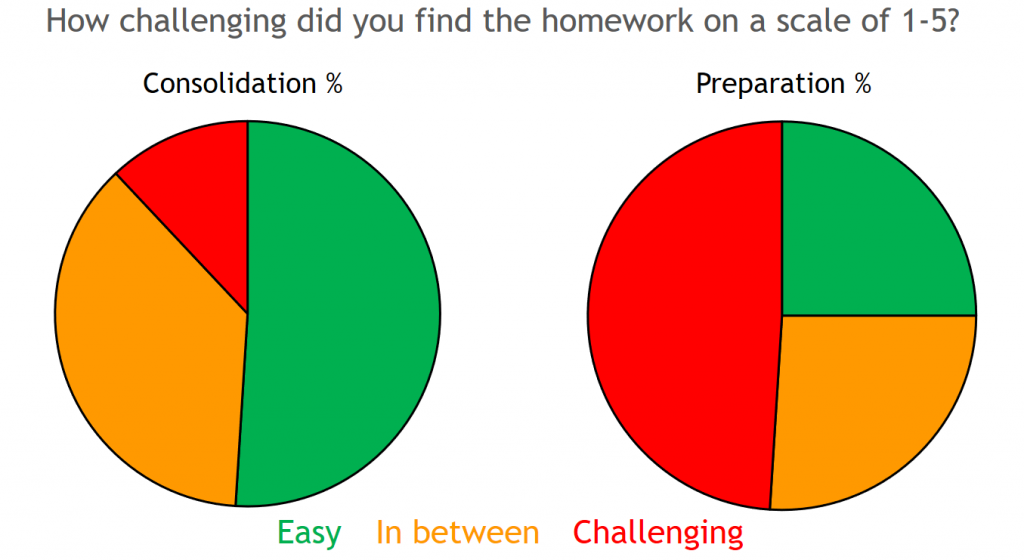
There is a clear difference between how challenging the students found the two types of homework. One reason for the students finding preparation homework generally more challenging, is that they have to think more for themselves without the support of previous classwork. With this style of homework being relatively new to the students, would their perception of how challenging it is change if it became the norm?
What do teachers think?
When beginning this study, an assumption made was that preparation homework would allow students to be able to progress further within a lesson, having already grasped the basics of the topic in their homework. However, this turned out to be a preconception in some subjects according to teacher experience, as shown in the comments below.
Maths: “For topics that students are familiar with, preparation homework has its place. However, for new topics, younger students don’t always have the skills to know how to help themselves and be independent. Although I initially thought that preparation homework would lead to more time for Mastery questions during the lesson, the homework took longer to go over at the start of the lesson to address misconceptions.”
Science: “I felt quite overwhelmingly that the preparation homework suited them brilliantly. The majority of children in the class have a Mastery baseline, and I felt like with this style of lesson it really gave the students more of a chance to demonstrate and access depth of understanding within the classroom setting, as I was quickly able to establish what they already knew and understood from the homework.”
English: “Both were really effective in different ways. The students preferred the preparation homework, however I felt that the consolidation homework was really valuable, because it was forcing them to act on feedback. The students found this harder, but it fits in with the Mastery curriculum and way of teaching.”
French: “When introducing new content through homework, although the students completed the homework task, it did not always lead to students being able to progress more quickly during the lesson. For example, it was still necessary to go over pronunciation and recognition of new vocabulary at the start of the lesson, as students didn’t necessarily retain the new content just from completing a reading comprehension activity on it for homework. Preparation homework also relies on all students completing the homework and to the best of their ability.”
Recommendations based on findings
The results of the survey showed that half of students would continue with preparation homework, but three quarters would also be happy to continue with consolidation homework. However, when using preparation homework, the value of it may need to be sold to the students and may require more training.
Based on the findings from this project, certain recommendations can be made to ensure that we are setting homework effectively. For maximum effectiveness consider:
- the frequency homework is set
- the type of homework set
- the teacher involvement and marking
- collaborative homework planning linked into assessment frameworks and schemes of work
- homework menus to cater for different students which also involve minimal marking.
References:
Higgins, S., Katsipataki, M., Kokotsaki, D., Coleman, R., Major, L.E., & Coe, R. (2014). The Sutton Trust-Education Endowment Foundation Teaching and Learning Toolkit [online]. London: Education Endowment Foundation, Available at https://educationendowmentfoundation.org.uk/resources/teaching-learning-toolkit/homework-secondary/ [Accessed 14/06/2017]
BBC Radio 4, (2014), The Educators [podcast]. John Hattie. Available at: http://www.bbc.co.uk/programmes/b04dmxwl [Accessed 14/06/2017]
Coe, R., Aloisi, C., Higgins, S., & Major, L.E., (2014), What makes teaching great? [online]. Centre for Evaluation & Monitoring, Durham University & The Sutton Trust, Available at https://www.suttontrust.com/wp-content/uploads/2014/10/What-Makes-Great-Teaching-REPORT.pdf [Accessed 14/06/2017]
Hattie, J., (2009), Visible Learning, Oxford, Routledge